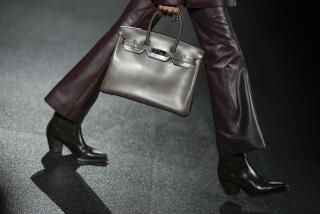A righteous handbag
WHO SPEAKS for the rich? Who will stand up for the right of a Rodeo Drive shopper to purchase accessories that are safely beyond the price range of some bargain-hunting slob in the heartland? This pressing issue was settled by the Supreme Court at the end of its term, in a broad 5-4 decision whose frivolous subject matter concealed some important implications for U.S. business.
Call it the Case of the Resold Handbag. City of Industry-based Leegin Creative Leather Products required stores carrying its line of Brighton accessories to comply with a no-discounts pricing policy. When Lewisville, Texas-based retailer Kay’s Kloset began discounting Brighton handbags — to great profit — Leegin pulled its products. The store sued, claiming that a 1911 Supreme Court decision known as the “Dr. Miles” precedent made such limited vertical price maintenance agreements illegal under the Sherman Antitrust Act.
In deciding for Leegin, Justice Anthony M. Kennedy overturned Dr. Miles’ reading that price maintenance agreements between a manufacturer and a retailer are per se Sherman Act violations; he substituted a “rule of reason” approach, in which courts can examine a larger body of evidence to establish whether an industry is in monopolistic danger.
In the specific case, Kennedy’s logic is hard to argue. Fashion is a creative industry that flourishes with little intellectual property protection, in large part because manufacturers work so hard to protect the value of their brands. It was absurd to claim that propping up the price of a luxury item — which draws much of its cachet from its very expense and exclusivity — should be treated in the same way as a manufacturer and retailer agreeing on the minimum price of, say, a piece of software. The agreement at issue was very limited in scope: an arrangement between a manufacturer and a seller for the one-time sale of a new product to an end user.
But the narrow circumstance in this case allowed the court the option of casting a narrow decision. Since 1911, the Supreme Court has in some instances allowed behavior that to the naked eye looked more egregious than Leegin’s, without throwing out the per se rule entirely. In choosing to overturn the Dr. Miles precedent, Kennedy, by his own admission, runs the risk of future instances in which businesses collude on prices for products more essential than handbags.
That risk — and the extra legal work that will now be needed to sort out what Justice Stephen G. Breyer’s dissent calls “the beneficial sheep from the antitrust goats” — may be worth taking. One of the principal laws of economics is that all value is relative. A business deal that looks kooky to an outsider may make perfect sense to the two parties involved in the deal. To the greatest extent possible, the law should avoid interfering in consensual agreements.
More to Read
A cure for the common opinion
Get thought-provoking perspectives with our weekly newsletter.
You may occasionally receive promotional content from the Los Angeles Times.






